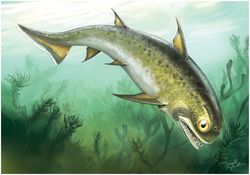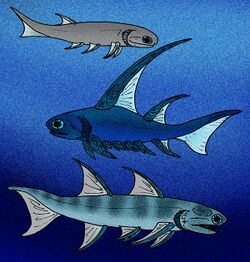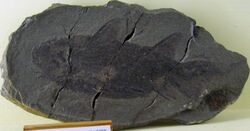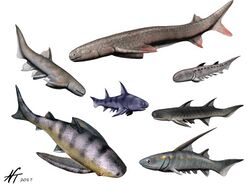Biology:Acanthodii
| Acanthodii | |
|---|---|

| |
| Nerepisacanthus, a Silurian acanthodian | |
| Scientific classification | |
| Domain: | Eukaryota |
| Kingdom: | Animalia |
| Phylum: | Chordata |
| Clade: | Eugnathostomata |
| Class: | †Acanthodii Owen, 1846 |
| Orders | |
| |
Acanthodii or acanthodians is an extinct class of gnathostomes (jawed fishes). They are currently considered to represent a paraphyletic grade of various fish lineages basal to extant Chondrichthyes, which includes living sharks, rays, and chimaeras. Acanthodians possess a mosaic of features shared with both osteichthyans (bony fish) and chondrichthyans (cartilaginous fish). In general body shape, they were similar to modern sharks, but their epidermis was covered with tiny rhomboid platelets like the scales of holosteians (gars, bowfins).[1]
The popular name "spiny sharks" is because they were superficially shark-shaped, with a streamlined body, paired fins, a strongly upturned tail, and stout, largely immovable bony spines supporting all the fins except the tail—hence, "spiny sharks". However, acanthodians are not true sharks; their close relation to modern cartilaginous fish can lead them to be considered "stem-sharks". Acanthodians had a cartilaginous skeleton, but their fins had a wide, bony base and were reinforced on their anterior margin with a dentine spine. As a result, fossilized spines and scales are often all that remains of these fishes in ancient sedimentary rocks. The earliest acanthodians were marine, but during the Devonian, freshwater species became predominant.[citation needed]
Acanthodians have been divided into four orders: Acanthodiformes, Climatiiformes, Diplacanthiformes, and Ischnacanthiformes.[2] "Climatiiformes" is a paraphyletic assemblage of early acanthodians such as climatiids, gyracanthids, and diplacanthids; they had robust bony shoulder girdles and many small sharp spines ("intermediate" or "prepelvic" spines) between the pectoral and pelvic fins. The climatiiform subgroup Diplacanthida has subsequently been elevated to its own order, Diplacanthiformes. Ischnacanthiforms were predators with tooth plates fused to their jaws. Acanthodiforms were filter feeders with a single dorsal fin, toothless jaws, and long gill rakers. They were the last and most specialized off the traditional acanthodians, as they survived up until the Permian period.[citation needed]
Characteristics

The scales of Acanthodii have distinctive ornamentation peculiar to each order. Because of this, the scales are often used in determining relative age of sedimentary rock. The scales are tiny, with a bulbous base, a neck, and a flat or slightly curved diamond-shaped crown.
Despite being called "spiny sharks", acanthodians predate sharks. Scales that have been tentatively identified as belonging to acanthodians, or "shark-like fishes" have been found in various Ordovician strata, though, they are ambiguous, and may actually belong to jawless fishes such as thelodonts. The earliest unequivocal acanthodian fossils date from the beginning of the Silurian Period, some 50 million years before the first sharks appeared. Later, the acanthodians colonized fresh waters, and thrived in the rivers and lakes during the Devonian and in the coal swamps of Carboniferous. By this time bony fishes were already showing their potential to dominate the waters of the world, and their competition proved too much for the spiny sharks, which died out in Permian times (approximately 250 million years ago).
Many palaeontologists originally considered the acanthodians close to the ancestors of the bony fishes.[citation needed] Although their interior skeletons were made of cartilage, a bonelike material had developed in the skins of these fishes, in the form of closely fitting scales (see above)[clarification needed]. Some scales were greatly enlarged and formed a bony covering on top of the head and over the lower shoulder girdle[citation needed]. Others developed a bony flap over the gill openings analogous to the operculum in later bony fishes[citation needed]. However, most of these characteristics are considered homologous characteristics derived from common placoderm ancestors[clarification needed], and present also in basal cartilaginous fish[citation needed]. Overall, the acanthodians' jaws are presumed to have evolved from the first gill arch of some ancestral jawless fishes that had a gill skeleton made of pieces of jointed cartilage.[citation needed]
Taxonomy and phylogeny
In a study of early jawed vertebrate relationships, Davis et al. (2012) found acanthodians to be split among the two major clades Osteichthyes (bony fish) and Chondrichthyes (cartilaginous fish). The well-known acanthodian Acanthodes was placed within Osteichthyes, despite the presence of many chondrichthyan characteristics in its braincase.[3] However, a newly described Silurian placoderm, Entelognathus, which has jaw anatomy shared with bony fish and tetrapods, has led to revisions of this phylogeny: acanthodians were then considered to be a paraphyletic assemblage leading to cartilaginous fish, while bony fish evolved from placoderm ancestors.[4]
Burrow et al. 2016 provides vindication by finding chondrichthyans to be nested among Acanthodii, most closely related to Doliodus and Tamiobatis.[2] A 2017 study of Doliodus morphology points out that it appears to display a mosaic of shark and acanthodian features, making it a transitional fossil and further reinforcing this idea.[5]
Phylogeny after[6]
| ||||||||||||||||||||||||||||||||||||||||||||||||||||||||||||||||||||||||||||||||||||||||||||||||||||||||||||||||||||||||||||||||||||||||||||||||||||||||||||||||||||||||||||||||||||||
Evolutionary history
The oldest remains attributed acanthodian-grade chondrichthyans are Fanjingshania and Qianodus from the Early Silurian of China, dating to around 439 million years ago.[7][8] Compared to other contemporary groups of fish, acanthodians were relatively morphologically and ecologically conservative. Acanthodians rose in diversity during the Late Silurian, reaching their apex of diversity during the Lochkovian stage of the Early Devonian, declining during the Pragian but rising again during the following Emsian, which was followed by a decline in diversity during middle-Late Devonian. The diversity of the group was consistently low but stable during the Carboniferous, slightly decreasing going into the Permian.[9] The youngest records of the group are isolated scales and fin spines from Middle-Late Permian strata in the Paraná Basin of Brazil.[10]
References
- ↑ Zhu, Min; Yu, Xiaobo; Ahlberg, Per Erik; Choo, Brian; Lu, Jing; Qiao, Tuo; Qu, Qingming; Zhao, Wenjin et al. (2013). "A Silurian placoderm with osteichthyan-like marginal jaw bones". Nature 502 (7470): 188–193. doi:10.1038/nature12617. PMID 24067611. Bibcode: 2013Natur.502..188Z.
- ↑ Jump up to: 2.0 2.1 Burrow, C.; Blaauwen, J.D.; Newman, M.; Davidson, R. (2016). "The diplacanthid fishes (Acanthodii, Diplacanthiformes, Diplacanthidae) from the Middle Devonian of Scotland". Palaeontologia Electronica 19 (1): 10A. doi:10.26879/601. https://palaeo-electronica.org/content/2016/1398-scottish-diplacanthid-fishes.
- ↑ Davis, S. P.; Finarelli, J. A.; Coates, M. I. (2012). "Acanthodes and shark-like conditions in the last common ancestor of modern gnathostomes". Nature 486 (7402): 247–50. doi:10.1038/nature11080. PMID 22699617. Bibcode: 2012Natur.486..247D.
- ↑ Barford, Eliot (September 25, 2013). "Ancient fish face shows roots of modern jaw". Nature. doi:10.1038/nature.2013.13823.
- ↑ Maisey, John G.; Miller, Randall F.; Pradel, Alan S.; Denton, John S.; Bronson, Allison; Philippe, Janvier (2017-03-10). Pectoral morphology in Doliodus : bridging the 'acanthodian'-chondrichthyan divide. American Museum Novitates. 3875).
- ↑ Chevrinais, Marion; Sire, Jean-Yves; Cloutier, Richard (2017-04-12). Beatty, Brian Lee. ed. "From body scale ontogeny to species ontogeny: Histological and morphological assessment of the Late Devonian acanthodian Triazeugacanthus affinis from Miguasha, Canada" (in en). PLOS ONE 12 (4): e0174655. doi:10.1371/journal.pone.0174655. ISSN 1932-6203. PMID 28403168.
- ↑ Andreev, Plamen S.; Sansom, Ivan J.; Li, Qiang; Zhao, Wenjin; Wang, Jianhua; Wang, Chun-Chieh; Peng, Lijian; Jia, Liantao et al. (September 2022). "Spiny chondrichthyan from the lower Silurian of South China". Nature 609 (7929): 969–974. doi:10.1038/s41586-022-05233-8. PMID 36171377. https://www.nature.com/articles/s41586-022-05233-8.
- ↑ Andreev, Plamen S.; Sansom, Ivan J.; Li, Qiang; Zhao, Wenjin; Wang, Jianhua; Wang, Chun-Chieh; Peng, Lijian; Jia, Liantao et al. (2022-09-28). "The oldest gnathostome teeth". Nature 609 (7929): 964–968. doi:10.1038/s41586-022-05166-2. ISSN 0028-0836. PMID 36171375. Bibcode: 2022Natur.609..964A. http://dx.doi.org/10.1038/s41586-022-05166-2.
- ↑ Schnetz, Lisa; Butler, Richard J.; Coates, Michael I.; Sansom, Ivan J. (July 2022). Sansom, Robert. ed. "Skeletal and soft tissue completeness of the acanthodian fossil record" (in en). Palaeontology 65 (4). doi:10.1111/pala.12616. ISSN 0031-0239. https://onlinelibrary.wiley.com/doi/10.1111/pala.12616.
- ↑ Mutter, Raoul J.; Richter, Martha (April 2007). "Acanthodian remains from the Middle-Late Permian of Brazil" (in en). Geological Journal 42 (2): 213–224. doi:10.1002/gj.1081. https://onlinelibrary.wiley.com/doi/10.1002/gj.1081.
Further reading
- Beneš, Josef (1979), Prehistoric Animals and Plants, Hamlyn, ISBN 978-0-600-30341-1, OCLC 1123277952
- Janvier, Phillipe (1996), Early vertebrates, Clarendon Press, ISBN 978-0-19-854047-2, OCLC 1123752232
- Long, John A. (1995), The Rise of Fishes: 500 Million Years of Evolution, Johns Hopkins University Press, ISBN 978-0-8018-4992-3, OCLC 811565755
- Palmer, Douglas, ed. (1999), The Simon & Schuster Encyclopedia of Dinosaurs & Prehistoric Creatures. A Visual Who's Who of Prehistoric Life, Simon & Schuster, ISBN 978-0-684-86411-2, https://archive.org/details/simonschusterenc00coxb
External links
- Acanthodii taxonomy
- †Ischnacanthiformes taxonomy
- †Climatiiformes taxonomy
- †Acanthodiformes taxonomy
- "PALAEOZOIC FISH UK". http://www.btinternet.com/~vendian/FOSSILWEB/new_page_9.htm.
- Acanthodopsis wardi
Wikidata ☰ Q130955 entry
 |



